| ||||||||||||||||
71 seats of The Punjab Legislative Council | ||||||||||||||||
|---|---|---|---|---|---|---|---|---|---|---|---|---|---|---|---|---|
| Turnout | 34.81% | |||||||||||||||
| ||||||||||||||||
 | ||||||||||||||||
First Provincial Legislative Council election was held in Punjab in 1920 as mandated by the Government of India Act 1919. [1]
| ||||||||||||||||
71 seats of The Punjab Legislative Council | ||||||||||||||||
|---|---|---|---|---|---|---|---|---|---|---|---|---|---|---|---|---|
| Turnout | 34.81% | |||||||||||||||
| ||||||||||||||||
 | ||||||||||||||||
First Provincial Legislative Council election was held in Punjab in 1920 as mandated by the Government of India Act 1919. [1]
The First World War gave the momentum to the growing demand for self-government in British India. Therefore, the new constitutional reforms, under the Montagu–Chelmsford Reforms were introduced by British Government. The scheme was implemented through the Government of India Act 1919. The first Council was constituted on 8 January 1921 for the first time. The election for first Council was held in December 1920. 71 members were elected and 22 were nominated by Governor. [2]
In 1920 the election was not contested on Party lines thus all elected candidates considered as Independent. [3]
The term of the council was fixed for three years. The council, for first time, was presided by a nominated person designated as President and in his absence, an elected person designated as Deputy President. [4]
The first election which was conducted in the house was of Deputy President between Mehtab Singh and Chaudhary M. Amin. Mehtab Singh won election by securing 48 votes, while Amin secured 37 Votes.
The First Council had held 98 meetings when the Lieutenant Governor of Punjab dissolved the council on 27 October 1923 after completion of three years tenure. [5]
| Category | Urban | Rural | Total |
|---|---|---|---|
| General | 7 | 13 | 20 |
| Mohammadans | 5 | 27 | 32 |
| Sikh | 1 | 11 | 12 |
| Special^ | - | - | 7 |
| Total | 13 | 51 | 71 |
Special^ (Non-Territorial)
| Post | Holder | Tenure | |
|---|---|---|---|
| President | Montagu Sherard Dawes Butler | 8 January 1921 | 21 March 1922 |
| Herbert Alexander Casson | 10 May 1922 | 27 October 1923 | |
| Deputy President | Mehtab Singh | 23 February 1921 | 24 October 1921 |
| Manohar Lal | 3 November 1921 | 27 October 1923 | |
| Ex-Officio Member | Sundar Singh Majithia | 8 January 1921 | 27 October 1923 |
| Secretary to Council | T. P. Ellis | ||
| Event | Date |
|---|---|
| Filing of Nominations | 5 November 1920 |
| Scrutiny of Nominations | 9 November 1920 |
| Polling | ? December 1920 |
| Counting | ? December 1920 |
Candidate Elected Unopposed
General-Urban
| S. No. | Constituency | Winner |
|---|---|---|
| 1 | Lahore City | Ganpat Rai |
| 2 | Amritsar City | Bhawani Shankar |
| 3 | South-Eastern Towns | Atma Ram |
| 4 | North-Eastern Towns | Panna Lal |
| 5 | East-Western Towns | Daulat Ram Kalia |
| 6 | North-Western Towns | Thakur Das |
| 7 | Western Punjab | Hari Chand |
General-Rural
| S. No. | Constituency | Winner |
|---|---|---|
| 8 | Hissar | Lajpat Rai |
| 9 | South-Eastern Rohtak | Sarup Singh |
| 10 | North-Eastern Rohtak | Lal Chad |
| 11 | Gurgaon | Balbir Singh |
| 12 | Karnal | Bans Gopal |
| 13 | Ambala-Simla | Daya Ram |
| 14 | Kangra | Motilal Kaistha |
| 15 | Hoshiarpur | Beli Ram |
| 16 | Jullundur-Ludhiana | Mela Ram |
| 17 | Lahore-Ferozpur-Sheikhupura | Ganpati Rai |
| 18 | Amritsar-Gurdaspur | Kharak Singh |
| 19 | Rawalpindi | Amar Das |
| 20 | Multan | Sewak Ram |
Muhammadan-Urban
| S. No. | Constituency | Winner |
|---|---|---|
| 21 | Lahore City | Muharram Ali Chisti |
| 22 | Amritsar City | Yusuf Shah |
| 23 | Western Punjab Towns | Akbar Khan |
| 24 | East West Central Towns | Nawab Din |
| 25 | South-Eastern Towns | Mir Mohammed Khan |
Muhammadan-Rural
| S. No. | Constituency | Winner |
|---|---|---|
| 26 | Gurgaon Hissar | Hayat Khan |
| 27 | Ambala | Shafi Ali Khan |
| 28 | Hoshiarpur Ludhiana | Rai Wali Khan |
| 29 | Ferozpur | Pir Akbar Ali |
| 30 | Jullundur | Mohammed Jamil Khan |
| 31 | Kangra Gurdaspur | Ali Akbar |
| 32 | Lahore | Mohammed Shah Nawaz |
| 33 | Amritsar | Nabi Baksh |
| 34 | Sialkot | Mohammed Amin |
| 35 | Gujranwala | Attullah Khan |
| 36 | Sheikhupura | Mohabat Ram |
| 37 | Gujarat East | Ghulam Muhammad Warraich |
| 38 | Gujarat West | Chaudhary Fazl Ali |
| 39 | Shahpur East | Ghulam Mohammed Shah |
| 40 | Shahpur West | Firoz Khan Noon |
| 41 | Mianwali | Saifullah Khan |
| 42 | Attock | S. H. Khan |
| 43 | Rawalpindi | Pir Ali Hyder Shah |
| 44 | Jehlum | Karimullah Khan |
| 45 | Lyallpur North | Amir Khan |
| 46 | Lyallpur South | Mehdi Shah |
| 47 | Montgomery | Husaini Shah |
| 48 | Multan East | Ahmed Yar Khan Daultana |
| 49 | Multan West | Raza Shah Gilani |
| 50 | Jhang | Hussain Shah |
| 51 | Muzaffargarh | Abdullah Khan |
| 52 | Dera Gazi Khan | Allah Khan Drishak |
Sikh-Urban
| S. No. | Constituency | Winner |
|---|---|---|
| 53 | Sikh Urban | Mehtab Singh |
Sikh-Rural
| S. No. | Constituency | Winner |
|---|---|---|
| 54 | Ambala Division | Rasa Singh |
| 55 | Hoshiarpur Kangara | Bakhtawar Singh |
| 56 | Jullundur | Balwant Singh |
| 57 | Ludhiana | Dasaundha Singh |
| 58 | Ferozpur | Kartar Singh |
| 59 | Lahore | Sangat Singh |
| 60 | Amritsar | Raghbir Singh |
| 61 | Sialkot Gurdaspur | Randhir Singh |
| 62 | Lyallpur | Dilbagh Singh |
| 63 | Multan Shekhupura | Bedi Hara Singh |
| 64 | Rawalpindi Gujranwala | Harnam Singh |
Special
| S. No. | Constituency | Winner |
|---|---|---|
| Landholders | ||
| 65 | Punjab (General) | Raja Narendra Nath |
| 66 | Punjab (Muhammadan) | Fazl-i-Husain |
| 67 | Punjab (Sikh) | Hardit Singh Bali |
| Tumandars | ||
| 68 | Baluch Tumandars | Jamal Khan Leghari |
| University | ||
| 69 | Punjab Universities | Manohar Lal |
| Commerce and Trade | ||
| 70 | Punjab Commerce and Trade | Edward E. Clarke |
| Industry | ||
| 71 | Punjab Industries | Harkishan Lal |

The Shiromani Gurdwara Parbandhak Committee is an organization in India responsible for the management of gurdwaras, Sikh places of worship, in the states of Punjab and Himachal Pradesh and the union territory of Chandigarh. SGPC also administers Darbar Sahib in Amritsar.

General elections were held for the first time in Singapore on 20 March 1948, when six of the 22 seats on the Legislative Council became directly-elected.

General elections were held in Singapore on 10 April 1951 to elect members to nine seats in the Legislative Council, up from six seats in the 1948 elections. A 32-day-long campaign period was scheduled, with nomination day on 8 March 1951. The result was a victory for the Progressive Party, which won six of the nine seats.
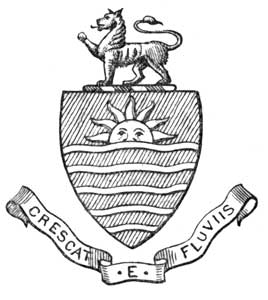
The Punjab Legislative Council was the unicameral legislature of British Punjab, a province of the British Raj. It was established in 1921 by the British authorities under Government of India Act 1919, the council had nominal powers and a membership of mainly pro-British politicians and government officials. Voting was largely boycotted until the Government of India Act 1935 increased representation and the powers of the assembly. It was dissolved in 1936 and was succeeded by Punjab Provincial Assembly.
Bombay Legislative Council was the legislature of the Bombay Province and later the upper house of the bicameral legislature of Bombay Province in British India and the Indian state of Bombay.

The Council of State was the upper house of the legislature for British India created by the Government of India Act 1919 from the old Imperial Legislative Council, implementing the Montagu–Chelmsford Reforms. The Central Legislative Assembly was the lower house.
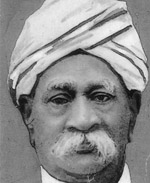
The first legislative council election to Madras Presidency after the establishment of dyarchical system of government by the Government of India Act 1919, was held in November 1920. Indian National Congress boycotted the election due to its participation in the Non-cooperation movement. The election occurred during the early stages of non-Brahmin movement and the major issue of the election was anti-Brahminism. Justice party won the election with no significant opposition and A. Subbarayalu Reddiar became the inaugural First Minister of the Madras Presidency.

The fourth legislative council election to Madras Presidency after the establishment of dyarchical system of government by the Government of India Act, 1919 in September 1930. Justice party won the election and P. Munuswamy Naidu became the First Minister. The main opposition party - Swaraj Party did not contest the elections due to its participation in the Civil Disobedience Movement.

The second legislative council election to Madras Presidency after the establishment of diarchical system of government by the Government of India Act, 1919 was held in 1923. Voter turnout was higher than the previous election. Swarajists, a breakaway group from Indian National Congress participated in the election. The ruling Justice Party had suffered a split, when a splinter group calling themselves anti-Ministerialists left the party. It won the highest number of seats but fell short of a majority. Nevertheless, Madras Governor Willington invited it to form the government. Incumbent Justice First Minister Panagal Raja was nominated by Party leader Theagaraya Chetty to continue as First Minister for a second term. The government survived a no-confidence motion, brought against it on the first day of its tenure by the opposition headed by C. R. Reddy.

In the fifth legislative council election to Madras Presidency after the establishment of dyarchical system of government by the Government of India Act, 1919 the ruling Justice party lost the election and the opposition Swaraj Party emerged as the single largest party. However, it refused to form the government, due to its opposition to dyarchy. The incumbent First Minister, Raja of Bobbili retained power and formed a minority government.
Diarchy was established in Madras Presidency based on the recommendations of the Montague-Chelmsford report. Five elections were held during the period diarchy was in effect and Justice Party occupied power most of the time. It ended with the election in 1937 when the Government of India Act 1935 came into effect.
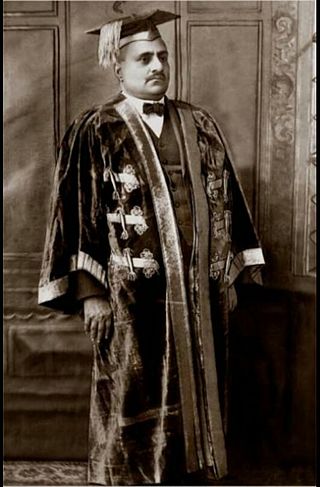
General elections were held in British India in 1920 to elect members to the Imperial Legislative Council and the Provincial Councils. They were the first elections in the country's modern history.
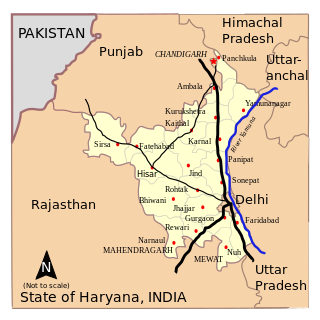
Elections in Haryana, which is a state in India, have been conducted since 1967 to elect the members of state-level Haryana Legislative Assembly and national-level Lok Sabha. There are 90 assembly constituencies and 10 Lok Sabha constituencies.

A Legislative Assembly election was held in the Indian state of Punjab on 4 February 2017 to elect the 117 members of the Fifteenth Punjab Legislative Assembly. The counting of votes was done on 11 March 2017. The ruling pre-election coalition was the alliance comprising the political parties Shiromani Akali Dal and Bharatiya Janata Party and led by Chief Minister Parkash Singh Badal. The voter turnout for the Punjab Assembly election was 77.2% The Indian National Congress led by former Chief Minister Captain Amarinder Singh defeated the ruling alliance and the newcomer Aam Aadmi Party.
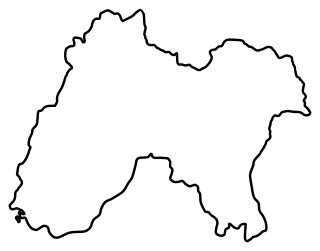
Elections to the Punjab Provincial Assembly were held in January 1946 as part of the 1946 Indian provincial elections.

First Provincial assembly election was held in Punjab in the winter of 1936-37 as mandated by the Government of India Act 1935.

Legislative Council elections were held in Punjab Province in British India in late 1923. They were the second legislative council elections held in the province under the Government of India Act 1919. The newly elected Council was constituted on 2 January 1924 when its first meeting was held.

Legislative Council elections were held in Punjab Province in British India in late 1926. They were the third legislative council elections held in the province under the Government of India Act 1919. The newly elected Council was constituted on 3 January 1927 when its first meeting was held.

Legislative Council elections were held in Punjab Province in British India in 1930. They were the fourth and last legislative council elections held in the province under the Government of India Act 1919. The newly elected Council was constituted on 24 October 1930 when its first meeting was held.

The Punjab Provincial Assembly was the legislature of the province of Punjab in British India. Established by British authorities under Government of India Act 1935, the assembly had executive powers and members directly elected from 175 constituencies by first past the post system.